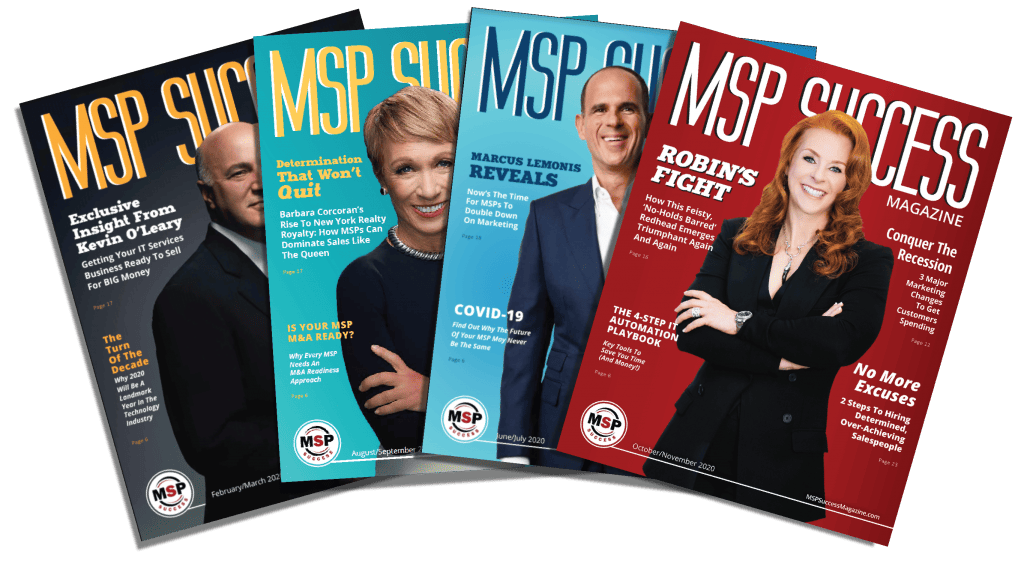The Current Problem.
Many MSPs addressed the pandemic by leaning into the confusion caused by the quarantine orders creating the work from home activity and by implementing strategies to conserve cash. These MSPs reduced their staff by eliminating low performers and turned to senior techs to expand their capacity. They reduced payroll expense and leaned into marketing. Meanwhile, the MSP’s clients needed them more than ever, as they too transitioned to work from home for their employees. Additionally, these same clients of MSPs retained employees in their core business operations while reducing ancillary services, like their technology departments, and then outsourced these technology functions. This drove more sales to the MSPs and revenue increased. To add to the MSPs liquidity, most MSPs benefited from an influx of cash from the SBA’s PPP and EIDL programs. Now, as we enter the fourth quarter, MSPs are faced with increased net income, increased cash, increased demand and a swelling income tax burden. More than ever, MSPs need to implement strategies to retain profits for continued operations while simultaneously minimizing their income tax obligations. Many will shortsightedly implement a few tactics to temporarily reduce taxes rather than implementing a comprehensive long-term plan for mitigating their income tax burden.
A Tax Plan is a Roadmap of your Journey.
A competent accountant looks in the rearview mirror and accurately depicts where you have been. It’s pretty difficult to plan a trip across the country by navigating your vehicle by looking into the rearview mirror at where you have been. A really good accountant will have you looking through the windshield and dodging obstacles that are immediately in the path of your journey. I have heard some indicate that their accountant is exceptional and assists in tax planning but, upon investigation, the accountant has implemented a few short-term tactics that will assist for 6 months to 2 years. A corporate tax attorney helps you to create a plan to arrive at your intended destination – primarily by getting out of the vehicle and designing the course for your journey from start to finish. Many people feel that accountants and tax lawyers are interchangeable. Their roles are actually different.
Why accountants are not equipped to create a tax plan.
Even with these exceptional accountants, there are obstacles to providing comprehensive planning advice. First, the tax preparing accountant is strapped to the legal structure of their client’s enterprise and has no power to alter the structure. In fact, if an accountant were to engage in planning by creating entities, legal structure planning, or designing agreements between related enterprises, they are really engaged in the unauthorized practice of law. A tax preparing account can only be reactive to yourcurrent legal structure.
Second, transactions which are primarily motivated to reduce taxes create exposure to the livelihood of the accountant themselves! The liability for potential for tax preparers could be devastating to the accountant’s career, and hence, the reluctance of accountants to consider comprehensive planning. The Internal Revenue Code (IRC § 6694(a)) creates penalties for tax preparers for understatement due to unreasonable positions. While the penalty is not necessarily significant if applied in a single or even a few matters, with electronic filing and the ability to sort by preparer, the risk of multiple exposures is real and significant. If the tax return preparer makes that recommendation for one client, it is likely that they are making the recommendation to other clients too. If the accountant exposes all of his or her returns to audit or review, not only does the tax return preparer expose clients to the risk of an audit, the tax return preparer themselves could sustain multiple penalties and the loss of business. It does not take a stretch of the imagination to understand that an accountant with multiple client audits is at risk of their losing clients.
A corporate tax lawyer does not ordinarily prepare the tax returns. The tax preparer penalty law (26 CFR 301.7701-15(b)(2)) really only provides for liability to non-signors of the tax return if they prepare a substantial portion of a return with respect to events that have already occurred. Corporate tax lawyers should be engaging in transactions for reasons other than tax mitigation (i.e. risk mitigation, asset protection planning, estate planning) even though the United States Supreme Court has opined that planning to avoid taxes is entirely legal. Practically speaking, it is far less likely for a client to stumble into an audit based upon the advice of the non-tax-return-signing corporate tax attorney.
Owner Relationship with Business.
The legal relationship between the MSP owner/operator (“Owner”) is not much different than the legal relationship that a CEO has with his or her publicly traded company employer. The differences, if any, involve increased flexibility in transactions for the Owner because of his or her multiple and distinct relationships with the MSP, including:
- An equity-holding investor expecting a return on investment from a high risk (as evaluated by the marketplace) enterprise;
- An employee;
- A creditor;
- Member of the Board;
- Creator of significant intellectual property used by the business and gratuitously donated to the business.
- A friend of the MSP that leverages personal friendships to secure reduced cost or no cost consulting services.
Each of these relationships provide opportunities to increase deductions, shift the character of income, shelter wealth, shifting income to less expensive taxpayers and instituting benefits that you have not seized upon due to expensive employees.
Do you have a Plan? Check for yourself.
Many think they have a tax plan because their accountant or business lawyer maneuvered some income or expenses last tax year. A comprehensive plan should address the following questions:
- Does the MSP owner tax returns and MSP’s business tax returns reflect the multiple roles identified above? The nature and character of your income from each of these roles is different from a tax perspective.
- Does your MSP pay you for the use of your credit? Do you think IBM’s president has to pledge her personal assets as security for IBM credit facilities? If IBM’s president does not have to provide this then you should question why you are not being paid for this accommodation.
- Does your MSP pay you interest for loans made to the MSP?
- Does your MSP pay you for the use of your personal assets?
- Do you deduct a portion of your house because you let your business use portions of the house?
- Do you find yourself planning personal trips around business related opportunities to save the company money?
- Do you leverage your personal relationships with friends, family and even your spouse and children for the benefit of the business?
- Do you donate intellectual property to your MSP without compensation?
- Do you have a plan that appropriately rewards you, the long term investor, when you place your assets at risk, use your property for business purposes, compensate your spouse for the time expended?
- Have you conducted a study of the fair and reasonable compensation you should have as W2 income? Are you paying more than you would have to pay someone similarly qualified to operate your business?
- Are you paying too little as a return on your passive investment?
- Are business activities of your enterprise properly segregated to reduce liability exposure?
- Are you lending money to your company in an unsecured position but not charging market interest?
- Have you studied whether you or your MSP should invest in other assets like commercial real estate as a part of an overall wealth enhancement strategy?
- Do you cut your MSP a deal on rent or act as a surety for the lease without any compensation?
- Do you avoid instituting benefits for you, as the CEO, simply because you, as an investor, do not want to provide the same benefits to other employees?
- Has anyone ever analyzed your Qualified Business Income or unadjusted basis of qualified property to design the Owner compensation level?
- Have you proactively and prospectively designed your enterprise to take advantage of any of the many tax credit programs that exist?
- Have you implemented a solution for storing unneeded wealth (income and profits beyond your current spending needs) and delaying income tax obligations until you need access to the wealth (and not just a retirement plan)?
- Are your business activities appropriately structured to maximize a potential acquisition or sale?
If you answer more than 3 of these questions in the negative, you likely do not have a comprehensive tax mitigation plan and would benefit by having a corporate tax attorney plan your journey.
Seek assistance from a Corporate Tax Attorney.
A competent accountant looks in the rear-view mirror and accurately depicts where you have been. A really good accountant will have you looking through the windshield and dodging obstacles that are immediately in the path of your journey. A corporate tax attorney helps you to create a plan to arrive at your intended destination – primarily by getting out of the vehicle and designing the course for your journey.
To be clear, having a good (or even great) accountant is vitally important to make sure your tax returns comply with the legal requirements and that you appropriately tax advantage of strategies in the short term. To enhance your overall net worth, proactively build a structure that allows you to unleash income tax savings.
Virtus Law PLLC has a team of attorneys dedicated to representing MSPs from the start of the MSP’s journey to the finish. Our team includes a tax attorney and an attorney involved in SMB tax planning for over 20 years. We offer a flat fee legal assessment where MSPs are guaranteed a return on their investment in the analysis in the first twelve months – a defense that actually scores you points. If retained by the end of October, we will likely be able to implement some of the solutions before the end of the year and, thereby, reduce your income tax burden for 2020. Click here to contacts us for a FREE consultation!

















